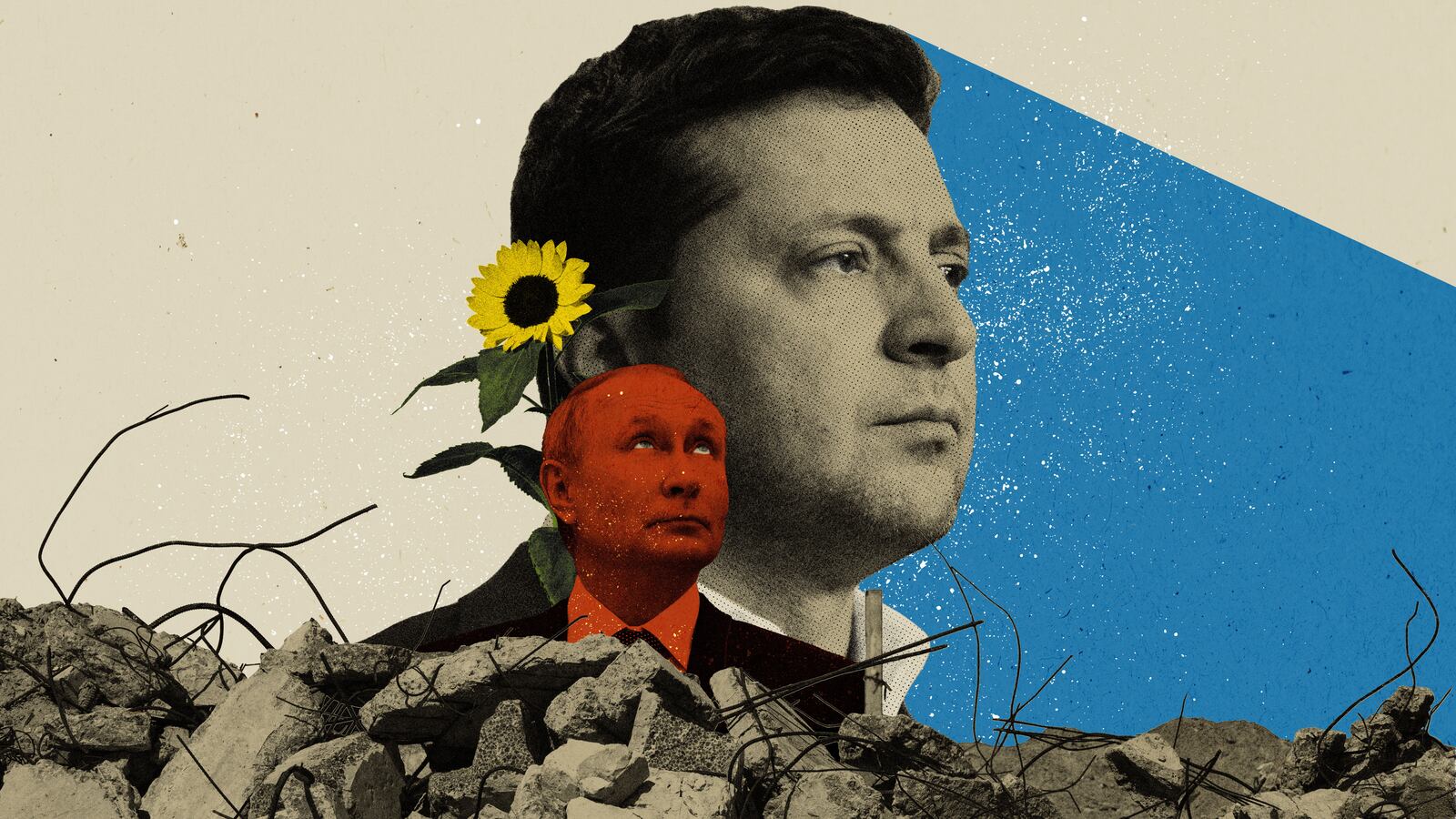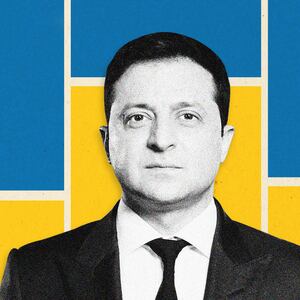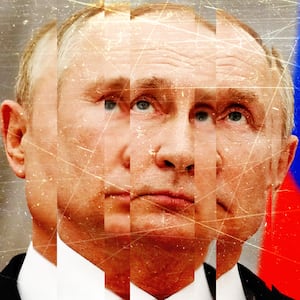As Russia’s forces invade Ukraine, working to topple the Ukrainian government, Ukrainian President Volodymyr Zelensky has emerged as an icon—and people are flocking to support him at his country’s moment of peril from all around the world.
In one turn, Zelensky has met the moment, stepping up into his role, not just as the president of a country under attack but as a people’s president and a valiant war hero fighting alongside his fellow Ukrainians.
In the hours after Russian President Vladimir Putin announced all-out attack on Ukraine, Zelensky took to the streets, sporting an olive-green jacket, and sent a selfie video to his citizens to show them he was not assassinated, not running away in the face of invasion, but still there and fighting to save the country.
He’s been sending selfie video updates to his citizens since to assure them of his safety—as intelligence has suggested Russia is seeking not just to attack Ukraine, but topple the Kyiv government and possibly take out Zelensky, too.
One particular moment that’s making Zelensky’s growing following swoon—when the United States offered to help Zelensky run with an evacuation plan, Zelensky chose to stay behind and fight. And his response, indeed, seemed made for primetime: “The fight is here,” Zelensky said of the Biden administration’s evacuation offer. “I need ammunition, not a ride.”
But Zelensky’s messages serve a dual purpose, beyond just reassuring Ukrainians the government still stands. Zelensky’s rallying cry to Ukrainians is an assurance that Ukraine is fighting, patriotic, unwavering—and never backing down.
For Ukrainians on the ground, Zelensky’s addresses and Ukraine’s messaging have deftly boosted morale in a dark time, said Peter Singer, a strategist and senior fellow at the New America think tank.
“They’ve done everything,” Singer told The Daily Beast. “From rapidly [driving] viral stories of heroes fighting back, like the ‘Ghost of Kyiv’ fighter ace, to the sacrifice of martyrs like the defenders of Snake Island and their iconic ‘Go fuck yourself’ to the Russia fleet, to the stories of civilians… volunteering to fight back in every way..”

Billboard saying "Russian military ship, fuck off!", legendary words of the border guards defending Zmiyinyi Island (Snake Island) in the Black Sea who refused to surrender to the enemy, Odessa, southern Ukraine
Nina Lyashonok/ Ukrinform/Future Publishing via GettyBut Zelensky’s appeal isn’t just about pummeling followers with reasons to fight. He’s winning politicians’ hearts and minds, too.
Some European leaders initially expressed some resistance to rolling out certain sanctions against Russia, instead preferring to use sanctions packages that had already been approved. But Zelensky hopped on a video call with them, and the arc of the story changed. He made an appeal to the other leaders, pleading for more aid, including food, supplies, and sanctions. And it was his emotional entreaty that left them with watery eyes and swayed them to drum up more support for Ukraine, as The Washington Post reported.
The European Union, the United States, the United Kingdom, and Canada then concluded they’d proceed to throttle Russia by isolating major Russian banks, going after Putin’s cronies, and, eventually, sanctioning Putin himself to mark him as the pariah he is.
Then followed a cascade of public and private sector rejections of Russia—BP is exiting its stake in Russia’s Rosneft, FedEx and UPS aren’t shipping to Russia anymore, Apple has stopped product sales in Russia, sports associations are kicking Russia out left and right—and the list goes on.
In one case, Zelensky used his social media platform to blast out the sheer oddity of other world leaders politicking while Ukraine fights for its existence. Italy’s Prime Minister Mario Draghi told parliament Zelensky somehow didn’t make it to a scheduled phone call with him earlier in the day last Friday. Zelensky quipped back on Twitter, publicly fighting for his cause.
“Today at 10:30 a.m. at the entrances to Chernihiv, Hostomel and Melitopol there was heavy fighting. People died. Next time I’ll try to move the war schedule to talk to #MarioDraghi at a specific time. Meanwhile, Ukraine continues to fight for its people,” Zelensky tweeted.
By Monday, Italy was promising to send Ukraine more aid.
Zelensky’s careful personalization of his messages has created a “bandwagoning effect,” Singer, who has previously advised the U.S. intelligence community, military, and FBI, told The Daily Beast. Zelensky is saying, “‘I’m out here, join me too, in your own way,’” Singer said. “That messaging is particularly targeted at his fellow European leaders. ‘I’m out here, I’m taking risks, why won’t you aid me?’”

President Volodymyr Zelensky, in his video address, demanded more decisive action from Western partners. He believes that there is still a real opportunity to stop Russian aggression in Ukraine.
Igor Golovniov/SOPA Images/LightRocket via GettyIt’s a stark difference from Zelensky’s first few years in office, when his approval ratings hovered at a measly 30-some percent. And Zelensky’s scorecard isn’t all singing reviews now, either.
Even in the buildup to Russia’s invasion of Ukraine, many doubted his ability to withstand the pressure and rise to the moment: He downplayed Putin’s aggression and obvious buildup of Russian troops along the border, much to the chagrin and distaste of his citizens. Critics say he didn’t call up his reserves early enough—he only called on them a few days before Putin pulled the trigger on invading.
In recent days, he’s even served as a reassurance to lawmakers in Washington, D.C. Some on Capitol Hill have been watching with bated breath to see whether Zelensky might break down at this moment of peril, said Sen. Mark Warner, the chair of the Senate Intelligence Committee.
Here, Zelensky has delivered, too.
“One of the questions the other day in the Intelligence Committee—was Zelensky going to be Ghani, the Afghan leader who cut and run once the Taliban started to move forward, or was he going to be Churchill?” Warner said at a recent Washington Post Live event. “And so far, he has been Churchillian in his response.”
Zelensky’s current appeal hasn’t just galvanized world leaders and rallied Ukrainians. People all around the world are suddenly smitten with Zelensky, and latching onto him in a kind of fawning, obsessive way.

Ukrainian President Volodymyr Zelensky delivers a statement during the 58th Munich Security Conference (MSC) on February 19, 2022 in Munich, Germany.
Ronald Wittek - Pool/GettyPeople around the world, Ukrainians and non-Ukrainians alike, are gushing over Zelensky on social media, latching onto him as an early wartime hero—and a worthy suitor, it seems.
Prominent accounts on Instagram have been circulating footage of Zelensky appearing to play the piano with his genitals—footage, needless to say, that comes from his days as a comedian. It’s not entirely clear why people are focusing on this one—it’s definitely NSFW and contrasts greatly with his current battle-hardened war broadcasts—but at a minimum, it seems people admire Zelensky’s multi-faceted career and his vivacious personality.
After Zelensky displayed his winning dance moves on Ukraine’s version of Dancing With The Stars in 2006, someone took to Twitter and posted: “So apparently Zelenskyy won the Ukrainian version of Dancing with the Stars in 2006 and the tape is even better than whatever you're imagining.”
Another prominent Instagram account posted a tweet that suggested nobody should be surprised when women start fessing up crushes on Zelensky. Another thirst trap suggested you can see four wonders from space: the pyramids in Egypt, the Amazon river, the Grand Canyon, and last but not least, “the balls of Volodymyr Zelensky.”
betches_sup, a popular Instagram account, has shared less cheeky notes on Zelensky. The account posted a timeline of his career in recent days—from his time starring in a television show in which he accidentally becomes the president (in a real-life life-imitates-art double-take moment); to his days dealing with President Donald Trump, who conditioned U.S. military aid on Zelensky digging up political dirt; to the streets of Kyiv, now, fending off invaders.
So how does a politician rising to a battle cry start wooing people around the world who are watching the war from afar?
“We need something to believe in right now… We are all functioning on fumes. We’re in three years of a pandemic… burnout is at an unprecedented high here in the U.S. and likely in other countries,” Dr. Aditi Nerurkar, a doctor with expertise in stress and resilience, told The Daily Beast. “That sense of needing a hero and savior is now more pronounced than ever” with a war raging on, Nerurkar, who has previously worked with the World Health Organization on refugee health, told The Daily Beast.
Nerurkar cautioned it will be tricky to toe the line between admiring the courage of Ukrainians and Zelensky, and needlessly glorifying their trauma. Even Zelesnky has begun to deflect some of the praise: “I’m not iconic, I think Ukraine is iconic,” the president said recently.
None of that should diminish Zelensky’s heroism, Ukrainians’ courage, or attempts to applaud it, though. “Zelensky deserves all of the praise. He deserves the hero moment. He has met the moment [and] Ukrainian people have redefined resilience,” Nerurkar said.
Zelensky is a worldwide sensation now, and has perhaps gained a level of admiration that Putin has always craved. And it’s Putin himself—having carefully tried to build his own following by releasing curated, bare-chested propaganda hunting videos for years in an attempt to project strength and machismo—who has seemingly forced the moment on Zelensky, and thrust him to his now iconic standing, just when Putin is trying to beat him down.
Putin took his country to war—but instead of coming out a valiant war hero, he has made one out of Zelensky.
Putin, in comparison, now appears bottom-of-the-barrel deranged. The images of Putin trying to show off his musculature in his propaganda videos from years past almost appear like an inside joke that he’s not in on, as they are now overshadowed by a more sinister, isolated, and even unhinged dictator.

Russian Prime Minister Vladimir Putin is pictured with a horse during his vacation outside the town of Kyzyl in Southern Siberia on August 3, 2009.
ALEXEY DRUZHININ/AFP via GettyHe’s delivered rage-filled revisionist speeches. He’s been sitting at a laughably long table, distanced physically and literally from his advisers. He inexplicably has a lot of outdated looking phones at his desk. Somehow, he has managed to turn himself into a caricature, not to be taken seriously just at the moment he wants to be taken most seriously—and indeed he’s turned into dozens of memes.
In a split screen with Zelensky fighting in the streets, sending out his own personal self-shot videos, Putin comes across as half-witted and rash now, if he didn’t earlier.
“You have Zelensky in the streets, taking risks himself—young, energetic, compared to elderly Putin at the end of this bizarrely long table… alone in his palace,” Singer said. “This is important not just in Ukraine [showing] our leader is with us, but it’s also important to external audiences in… crucial ways. It creates a vivid contrast with the villain of the story.”
And that may just be Zelensky’s je ne sais quoi the world can’t stop thinking about—it’s not just that he seems more a people’s president than ever, as he fights alongside his citizens. It’s not just that he’s taking time to offer words that can ease his people’s fear at such grim times. It’s not just that he seems to be a dashing dancing machine. It’s also that his messaging—and his government’s whole messaging infrastructure—seem perfectly suited to go viral, from eloquent, cheeky posts to passionate pleas.
”Overall, for all the narrative of the Russians being the ‘masters’ of information warfare, the Ukrainians have been teaching a master class at it,” Singer said, citing the Ukrainian government’s efforts to flood the field with messaging to disavow Russian disinformation and to highlight civilians’ acts of patriotism. “They have engaged in a multi-pronged effort that has driven their point of view viral and repeatedly gotten ahead of or defanged each of the old Russian… plays.”

Demonstrators hold protest placards, with a depiction of Russian President Vladimir Putin seen in front, opposite the Russian Embassy in London, Britain, March 1, 2022.
REUTERS/Toby MelvilleAnd again, where Zelenksy wins, Putin fails.
Russia has run so many information operations in recent years that everybody has already smoked them out, making them ineffectual this time around—something Putin doesn’t seem to get, according to Singer. The Russians are “masters” at propaganda, Singer said. “But their information war tactics have been seen and studied by all for the last several years, not just by Ukraine, but by governments around the world and citizens around the world. We’ve seen it and yet they’re trying the same stuff.”
But Zelensky comes out, no doubt, as the true hero, said Singer.
“After all the years of being beaten down by the pandemic, social division, fears of the rise of authoritarianism and fascism… this story of a clear villain and heroes fighting back—it just resonates so powerfully.”








